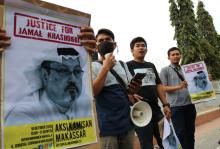Yemen

MARCH 25 marks the sixth anniversary of the start of the brutal and tragic war in Yemen. The Saudi-led coalition’s offensive operations, code-named Operation Decisive Storm, began with airstrikes and a naval blockade against Houthi rebels with the goal of restoring Yemen’s ousted government. With early and extensive U.S. military support, this war has created what many consider the most severe humanitarian crisis on the planet.
During his presidential campaign, Joe Biden promised a policy reset on Yemen. “I would end U.S. support for the disastrous Saudi-led war in Yemen and order a reassessment of our relationship with Saudi Arabia,” Biden said. “It is past time to restore a sense of balance, perspective, and fidelity to our values in our relationships in the Middle East. President Trump has issued Saudi Arabia a dangerous blank check. Saudi Arabia has used it to extend a war in Yemen that has created the world’s worst humanitarian crisis, pursue reckless foreign policy fights, and repress its own people.”
Biden’s promise offers hope to those committed to peace, but his administration must do much more than help pick up the pieces. Yemen needs humanitarian aid, an end to the blockade, and good faith diplomacy.
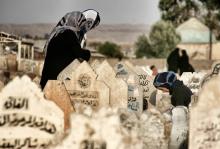
THE TRUMP administration, members of Congress, and many media pundits often speak and act as if the United States must choose between acting in its own interest and respecting deeper moral values. That’s a false choice.
Events on the world stage in recent months have offered abundant reminders that the United States’ cozy and corrupt relationship with Saudi Arabia and its tyrannical royal family is a bipartisan moral failure with real costs in human lives. In the name of perceived national interests, the U.S. has long engaged in an amoral realpolitik throughout the world, especially regarding the Middle East. In 2019, this includes Trump’s defiant support for Saudi Arabia, despite rising dissension in his own political party.
In recent months, some in Congress and throughout civil society are more openly questioning the U.S. relationship with the Saudi Arabian leadership, for two major reasons.
The first is the four-year-old military campaign in Yemen led by Saudi Arabia and materially supported by the U.S. that has created the world’s worst ongoing humanitarian crisis. By November, the war had caused—by Save the Children’s estimate—85,000 Yemeni children to starve to death. Sufficient food is arriving to Yemen, but the economic devastation caused by the Saudi-led campaign makes it impossible for many parents to buy enough food to feed their children, and conditions on the ground make distributing emergency food aid extremely difficult.
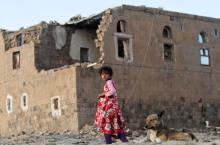
The U.S. Senate delivered a rare double rebuke to President Donald Trump on Saudi Arabia on Thursday, voting to end U.S. military support for the war in Yemen and blame the Saudi crown prince for the murder of journalist Jamal Khashoggi. The votes were largely symbolic because to become law the resolutions would have to pass the House of Representatives, whose Republican leaders have blocked any legislation intended to rebuke the Saudis.
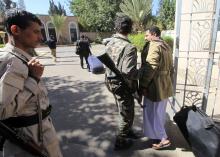
Yemen's warring sides agreed to free thousands of prisoners on Thursday, in what a U.N. mediator called a hopeful start to the first peace talks in years to end a war that has pushed millions of people on the verge of starvation. U.N. mediator Martin Griffiths told a news conference in a renovated castle outside Stockholm that just getting the warring sides to the table was an important milestone.
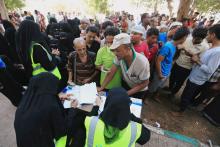
The United Religions Initiative, The Charter of Compassion, and The Parliament of the World’s Religions released a joint statement yesterday calling for “an immediate cease-fire in the civil war between the Yemen government and the Houthis rebels.”
The letter states that aid workers from religious and humanitarian organizations have been restricted from administering food, water, shelter, and healthcare to 14 million people enduring a deadly famine.

THE CONTROVERSIAL Jan. 29 attack by U.S. forces on a rural township in Yemen exemplifies the failed U.S. policy in the region.
In the first military raid carried out by the Trump administration, one U.S. soldier and at least 25 civilians were killed in the attack on the village of al-Ghayil in central Yemen, including nine children under the age of 13. Among these was 8-year-old Nawar al-Awlaki, an American citizen, who was shot in her family’s house. Other civilians killed included visitors whose family has been active in U.N.-mediated de-escalation committees, working to quell violence in the region.
Some leaders of al Qaeda in the Arab Peninsula (AQAP) also lived in al-Ghayil. AQAP has taken advantage of Yemen’s multi-sided civil war to find refuge in remote areas. AQAP maintains an uneasy relationship with local tribes, many of whom abhor al Qaeda’s violent excesses and reactionary interpretation of Islam but respect AQAP’s ability to fight common enemies.
When Navy SEALs found themselves under fire, they called in airstrikes. The barrage hit houses where families slept, killing people and livestock. Navy SEAL William “Ryan” Owens was also killed.
President Trump initially blamed his own generals and former President Obama for the botched raid. Then, in his first address to Congress, Trump pivoted, describing it as “a highly successful raid that generated large amounts of vital intelligence.” Owen’s widow was present; Trump referred to her multiple times in his address. Owen’s father refused to meet with the president and asked for an investigation into his son’s death.
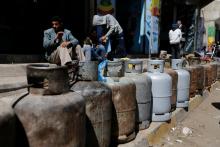
"We have some 21 million people needing assistance and seven million of those are in famine-like conditions and rely completely on food aid," U.N. humanitarian coordinator for Yemen Jamie McGoldrick said.
"The continued closure by the Saudi-led coalition of critical seaports and airports is aggravating an already dire humanitarian situation. I think it poses a critical threat to the lives of millions who are already struggling to survive."
McGoldrick was speaking to reporters in Geneva by phone from Amman, because he said flights into Sanaa were blocked.

A three-judge panel of the San Francisco-based 9th U.S. Circuit Court of Appeals partially granted a Trump administration request to block at least temporarily a judge's ruling that had put the new ban on hold. Trump's ban was announced on Sept. 24 and replaced two previous versions that had been impeded by federal courts.
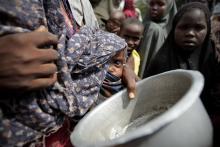
Buried beneath daily headlines dominated over the past year by the Russia investigation, Brexit, and the impasse over health care lies an escalating humanitarian crisis that should be breaking our hearts and assaulting our consciences: More than 20 million people’s lives hang in the balance due to a mounting famine in Yemen, South Sudan, northern Nigeria, and Somalia.

The court ruled that Trump may bar people from six majority Muslim countries — Iran, Libya, Somalia, Sudan, Syria, and Yemen — if they have no “bona fide” relationship to the U.S. Those that have established ties will be allowed to continue entering the country.
That means officials at the Department of Homeland Security and the State Department will have to begin sorting through each application submitted by travelers from the six targeted countries to determine if they have enough of a link to the U.S. to enter.

The Justice Department asked the Supreme Court to break its losing streak in lower courts and revive President Trump’s travel ban on immigrants from six predominantly Muslim nations.
The request came on June 1 in three separate petitions to courts in Richmond, Va., and San Francisco that blocked the president’s executive order barring most immigrants from countries deemed at risk for terrorism, as well as international refugees.

A federal appeals court in Richmond has delivered yet another blow to President Trump’s effort to institute a travel ban targeting six majority-Muslim countries, making a final Supreme Court showdown more likely.
The full U.S. Court of Appeals for the 4th Circuit ruled 10-3 on May 25 to uphold a lower court’s decision that barred the Trump administration from implementing its second attempt at the travel ban.

President Trump, long-chided for failing to address a surge in hate crimes, began his first address to Congress by invoking Black History Month, and condemning recent threats against Jewish institutions and the shooting of Indian men in Kansas City.
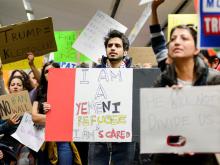
Despite President Trump’s threat of a “Muslim ban” during the 2016 campaign, Hadil Mansoor Al-Mowafak, a 20-year-old international affairs student at Stanford University, was taken aback when he banned travel from seven Muslim countries, including Yemen, where her husband lives.
“I didn’t think it was even possible,” Al-Mowafak said. “I thought he just used the Muslim ban during his campaign, and once he took power he’d face reality.”

Uzhunnalil claims that his captors have made repeated attempts to negotiate with the Indian government and Catholic officials, but he says nothing has happened. “I am very sad that nothing has been done seriously in my regard.
“If I were a European priest, I would have been taken more seriously by authorities, and people and would have got me released,” Uzhunnalil continued. “I am from India and perhaps am not considered of as much value. I am sad about this.”

President George W. Bush let innumerable attacks on his decisions, intelligence, and character roll off his back while he was in office. But facing the families of soldiers killed in Iraq and Afghanistan took a heavy emotional toll on his presidency.
Bush wrote more than 4,000 letters to these families. He also met with many of them, behind closed doors and away from cameras and reporters. The dramatic scenes, according to first lady Laura Bush, were “incredibly emotional.”
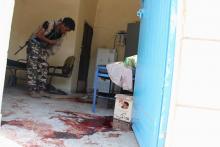
A chilling, eyewitness account of a deadly attack on a Catholic nursing home in Yemen has detailed how four nuns were sought out by gunmen who then executed them before destroying the Christian symbols in the residence’s chapel. According to the lone surviving nun, the attackers, allegedly Islamic extremists, entered the complex in Aden at around 8:30 a.m. on March 4 and first killed a guard and driver

Pope Francis said four nuns executed by gunmen in Yemen at a home where they cared for elderly and disabled residents are “today’s martyrs.” His remarks on March 6 about the brutal killings in the increasingly lawless country on the Arabian Peninsula came a day after he decried the “diabolical violence” that claimed the lives of a dozen others at the Catholic-run facility in the Red Sea port of Aden.

Four nuns from the order founded by Mother Teresa of Calcutta are reportedly among 16 killed by gunmen who attacked a church-run retirement home in Yemen, the latest attack on Christians in the increasingly lawless country.
The women religious, members of the Missionaries of Charity congregation, were killed when four armed men attacked the convent and home for the elderly in the southern city of Aden on March 4, the Catholic news agency Fides reported.
